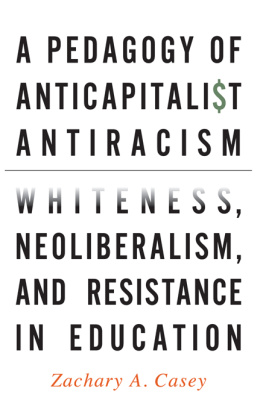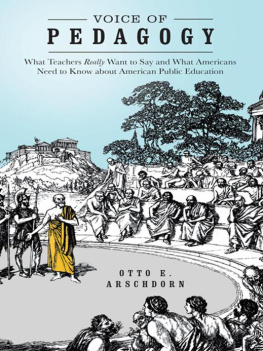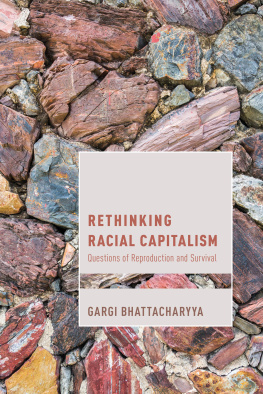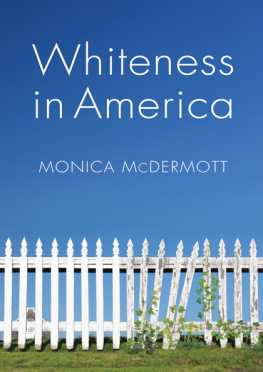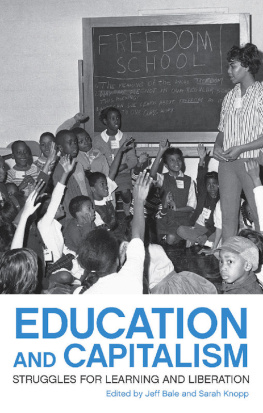A PEDAGOGY OF
ANTICAPITALIST ANTIRACISM
A PEDAGOGY OF
ANTICAPITALIST
ANTIRACISM
Whiteness, Neoliberalism,
and Resistance in Education
ZACHARY A. CASEY
Published by State University of New York Press, Albany
2016 State University of New York
All rights reserved
Printed in the United States of America
No part of this book may be used or reproduced in any manner whatsoever without written permission. No part of this book may be stored in a retrieval system or transmitted in any form or by any means including electronic, electrostatic, magnetic tape, mechanical, photocopying, recording, or otherwise without the prior permission in writing of the publisher.
For information, contact State University of New York Press, Albany, NY
www.sunypress.edu
Production, Jenn Bennett
Marketing, Michael Campochiaro
Library of Congress Cataloging-in-Publication Data
Names: Casey, Zachary A., 1985- author.
Title: A pedagogy of anticapitalist antiracism : whiteness, neoliberalism, and resistance in education / Zachary A. Casey.
Description: Albany : State University of New York Press, 2016. | Includes bibliographical references and index.
Identifiers: LCCN 2016007694 (print) | LCCN 2016020254 (ebook) | ISBN 9781438463056 (hardcover : alk. paper) | ISBN 9781438463070 (e-book)
Subjects: LCSH: Public schoolsUnited StatesFinance. | Discrimination in educationUnited States. | Capitalism and educationUnited States. | Privatization in educationUnited States. | TeachersTraining ofUnited States. | WhitesUnited StatesRace identity.
Classification: LCC LB2825 .C327 2016 (print) | LCC LB2825 (ebook) | DDC 370.11/5dc23
LC record available at https://lccn.loc.gov/2016007694
10 9 8 7 6 5 4 3 2 1
For my teacher-students, and student-teachers
Contents
Prologue
W hat are you? she asked.
It was the first week of class, in the first semester of my PhD program at the University of Minnesota. We were sitting in a circle at the Kitty Cat Klub, a local bar, just after a public talk called Policy and a Pint. The event featured a representative from Teach For America and the TFA alum who had just won Teacher of the Year for the state of Minnesota. We were all in the same program, at the same university, and we were all white. We then had a conversation that I have engaged in many times with people of many different races, but particularly with white people. For some reason, it seems to me that these conversations happen more often with white people who have an aversion to alienating racial others, or more bluntly, to sounding racist. What are you? in these moments most often asks the questioned party to list one or more (for white folks, European) countries they are descended from, and thus are.
When prompted I usually answer, Im white, and from the U.S. Which of course does not answer the question in the way it was intended, and so I shift to saying, Im mostly Irish, Swedish, French, and Ukrainian. I am sure there are many countries missing from this list, but of course, any list of this kind is absurd. Im from the United States, and having had the unique privilege to visit the countries I am from in this context, I can assure the reader that I am not from any country in Europe, and thus a term such as European American lacks any relevance for someone like me, whose ancestors have been in the United States for many generations, and who have been white so long that any other identity would simply not do us justice.
Answering the question What are you? represents a form of hailing These works seek to defend the insights of critical theory in the Marxist tradition against the influx of critical work that characterizes itself as poststructural, postmodern, and the myriad other posts we could list here. It is not my aim to make such arguments herein other words; this is not a text that is written solely for Marxists, or a text that attempts to dissuade people from mobilizing poststructural insights or theories. I have made every effort, in fact, to present the theories and histories I detail in such a way that many different practitioners and thinkers can appropriate for themselves what they deem to be the worthy elements and arguments of this work. For me, this brings to mind one of my favorite quotes from bell hooks (1994), who in her discussion of Paulo Freires work that includes sexist and patriarchal language writes, Think of [his] work as water that contains some dirt. Because you are thirsty you are not too proud to extract the dirt and be nourished by the water (p. 50).
Thus, I ask the reader to not get stuck at the level of What are you? and rather to approach this work critically with an aim to extract whatever water might exist in it for you, and to spit the dirt as it may feel to you, in an effort to appropriate for yourself what this text can help us with. Specifically, this work is imagined for teacher educators and antiracist practitioners in a variety of pedagogical settings. This work offers historical accounts, theoretical critiques, and details of anticapitalist antiracist pedagogy broadly imagined.
As will become clear in the chapters that follow, there is much work to be done to mobilize white people, and white teachers in particular, for antiracist action. We should take seriously the finding that white privilege as a concept and as the primary means of engaging white people in antiracist struggle has not been able to capture the hearts and minds of all of those for whom it was intended. We should also take just as seriously that the professionalization of the teaching force has not brought with it the longed-for outcome of a more critical, respected, and better prepared mass of teachers. There is more work to be done, that must be done, and there is a need for new theories, arguments, and discourses to aid us in this work. My aim here is to move antiracist pedagogies toward a position of radical solidaritya comprehensive attitudinal paradigm that creates spaces for all those engaged in anti-oppressive struggle to approach their work with new insights, aims, and questions.
And thus, with these caveats and frames in mind, I begin.
Acknowledgments
I am grateful for the support on this project from Elyse M. Wigen, Timothy J. Lensmire, The Midwest Critical Whiteness Collective, Shannon K. McManimon, and Brian D. Lozenski. This text would not have been possible were it not for the countless hours spent discussing, reading, and learning together.
Portions of are adapted from Casey, Z. A. (in press), Whiteness, Nationalism, and Neoliberalism: What Pat Buchanan and the Right Can Teach Us about Resisting Neoliberalism in Schools. In M. Abendroth & B. J. Porfilio (Eds.), School against Neoliberal Rule . Information Age Publishing.
Portions of are adapted from Casey, Z. A. (2013). Toward an Anticapitalist Teacher Education. Journal Of Educational Thought , (2), 123143.
ONE
How My Family and I Became White
Introducing the Task at Hand
Therefore this presupposition by no means arises either out of the individuals will or out of the immediate nature of the individual, but that it is rather historical, and posits the individual as already determined by society.
Grundrisse
The philosophers have only interpreted the world, in various ways. The point, however, is to change it.
Theses on Feuerbach
Introduction
I have spent virtually the whole of my teaching life feeling too young to be doing what I do. The result is that very few people actually know how old I am, and I like it that way. Now, in my work to understand the history of white supremacy and the ways in which my own experiences and history have been shaped by its ongoing legacy, it feels important to locate myself and when I was bornbecause I was born white, and being born white is a relatively new phenomenon.

